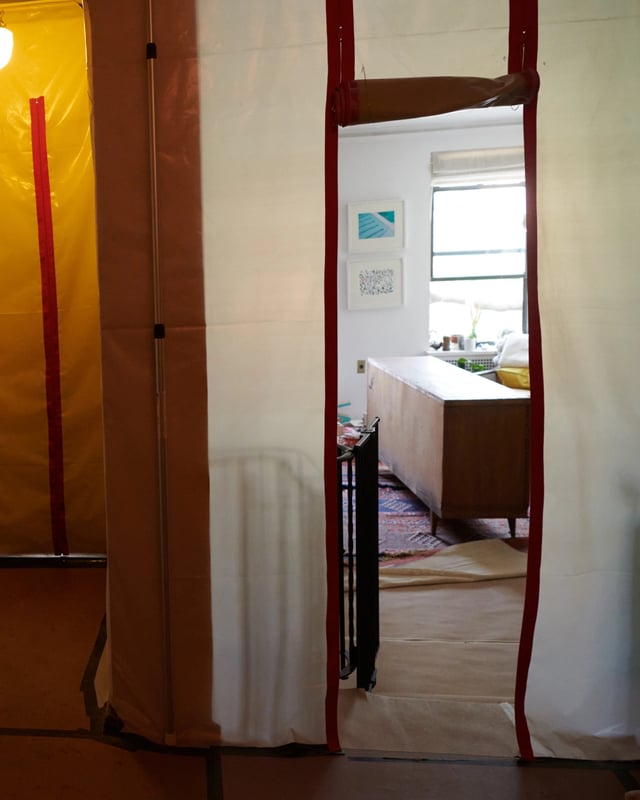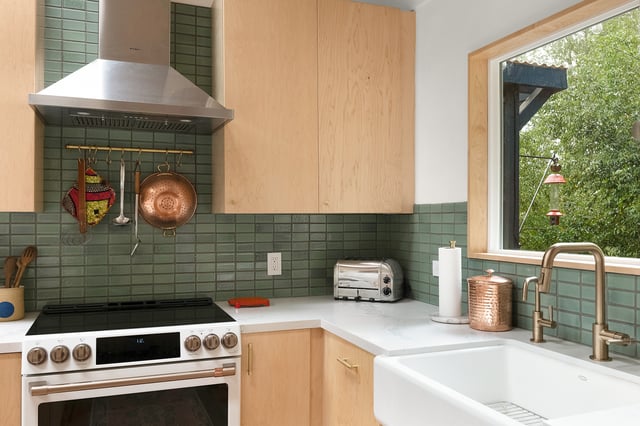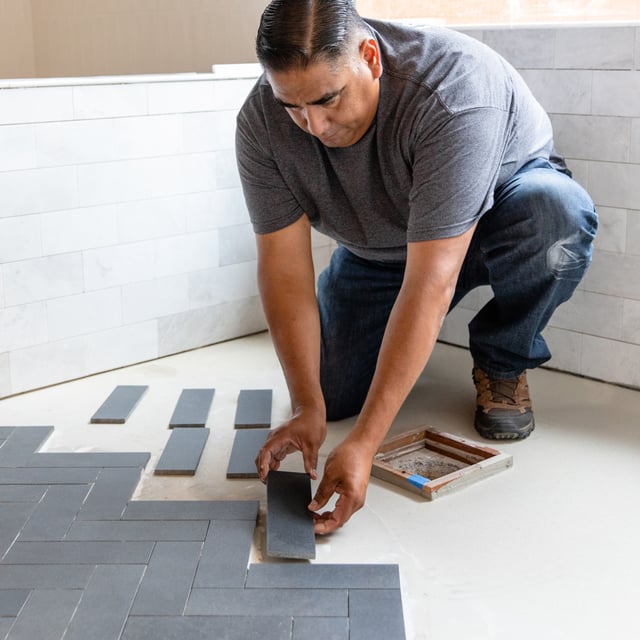
How to
Small House Renovations: Solutions for Limited Space
07.02.2025
Our New Year savings event is here: Get up to $6,500 off your project today (terms apply).


In This Article
Have you ever dreamed of revamping your home but felt a bit nervous about the process? You're not alone! Starting a renovation project is thrilling, yet putting safety first is crucial. While transforming your space is exciting, there are risks such as physical injuries, property mishaps, and even exposure to hazardous materials. But don’t worry; we're here to help! In this guide, we’re sharing simple and actionable safety tips to keep both homeowners and contractors safe while making your dream home a reality. Let's get started on this safe and exciting journey!
Planning for safety should be your first step before you even pick up a hammer. By preparing wisely, you can prevent accidents and ensure everything runs smoothly throughout your renovation project. Let’s explore how a little research and preparation can make a big difference in keeping everyone safe.
Before you begin your renovation, it’s vital to understand local building codes and permits. These guidelines ensure that your project is safe and up to standard, preventing unnecessary legal or safety issues. Make sure to research what permits you need and comply with all regulations to keep your project on track.
Identifying potential hazards before starting any work is just as important. Look around your home and pinpoint areas that might pose risks, like old wiring or areas with mold. Knowing these dangers ahead of time helps you plan better and protect everyone involved in the renovation.
When budgeting for your renovation, it's crucial to set aside funds specifically for safety equipment and materials. For instance, investing in high-quality gloves, masks, and goggles can prevent injuries and protect your health during the renovation process. By including these essential items in your budget, you’ll ensure that safety remains a priority without unexpected costs down the line.
Hiring the right professionals is key to a safe and successful renovation. Choosing licensed and insured contractors ensures that they are qualified and accountable for their work. This can save you from potential headaches and safety issues in the future.
Here’s how to vet contractors effectively:
Keeping yourself and others safe during a renovation is just as important as the project itself. Personal safety measures ensure that everyone involved is protected from potential harm while working. Let’s dive into some essential practices that will help keep you and your team safe throughout the renovation process.
Essential personal protective equipment (PPE) plays a crucial role in keeping you safe during a renovation:
Ensuring proper fit and use of all PPE is essential to maximize protection and prevent injuries. Always check for damages or wear and replace gear as needed to maintain safety standards.
A fully stocked first aid kit is essential for handling minor injuries on-site. Here’s what you should include:
Providing basic safety training for everyone involved in the renovation project is a smart move. This training should cover how to properly use tools and equipment, as well as the importance of wearing protective gear. Ensuring that everyone knows how to work safely can significantly reduce the risk of accidents and injuries.
Understanding emergency procedures is equally important for a safe working environment. Everyone should know what to do in case of a fire, electrical accident, or any other emergency situation. By being prepared for the unexpected, you can ensure a quick and effective response, keeping everyone safe and minimizing potential damage.
Creating a safe work site is crucial for a smooth renovation experience. With some thoughtful practices, you can minimize risks and ensure everyone remains safe and sound. Let’s explore some key site safety practices that will help keep your renovation on track and injury-free.
Keeping a clean and organized workspace is essential to prevent accidents like trips and falls. By regularly tidying up and removing unnecessary items, you make it easier for everyone to move around safely. A clutter-free environment not only reduces the risk of injury but also enhances productivity by providing a neat, efficient space to work in.
In addition to minimizing clutter, safely storing tools and materials is crucial. Tools should be returned to their designated spots after use, and materials should be stacked or stored securely to avoid unexpected shifts or spills. This not only prevents accidents but also ensures that valuable items are protected and easy to find when needed.
Before using any tools or equipment, it's important to inspect them for damage. Check for things like frayed cords, loose parts, or cracks that could lead to malfunctions or accidents. By catching these issues early, you can avoid potential injuries and ensure everything operates smoothly.
Following the manufacturer guidelines for safe operation is another crucial step. These instructions are designed to help you use tools correctly and safely, minimizing the risk of injury. Always take a moment to read the manual or safety stickers, and never hesitate to reach out for expert advice if you're unsure about any equipment.
Securing the work area helps keep curious kids, pets, and other unauthorized individuals safe from potential hazards. Setting up barriers, like temporary fences or locked gates, can effectively block off any dangerous spots. Additionally, placing clear warning signs highlights areas that are off-limits, ensuring everyone knows to keep a safe distance.
These simple steps can prevent accidents and give you peace of mind while working. By controlling who enters the workspace, you’re taking an important measure to protect both those nearby and the integrity of the renovation project itself.
Every renovation project comes with its unique set of hazards that require special attention. By understanding these specific risks, you can take proper precautions to keep everyone safe and sound. Let’s dive into some tailored safety tips for handling particular challenges during your renovation adventure.
When working with electrical components, always prioritize safety by turning off the power at the breaker box. This simple step can prevent electrical shocks and ensure that everyone stays protected while making necessary adjustments. It's a vital precaution that can save lives and prevent serious injuries.
For complex electrical tasks, it's best to hire a licensed electrician. Professionals have the expertise and tools needed to handle intricate wiring issues safely and efficiently. By bringing in an expert, you can enjoy peace of mind knowing that your electrical work meets safety standards, reducing the risk of mistakes and hazards.
Dealing with hazardous materials like asbestos, lead paint, or mold requires special care and expertise. It's important to hire professionals for safe removal, as they have the right equipment and knowledge to handle these dangers without putting anyone at risk. This ensures that your home becomes a safe haven without the hidden threats of harmful substances.
Proper disposal of toxic materials is just as crucial to maintaining safety. Following local regulations and guidelines helps prevent environmental contamination and keeps your community safe. By responsibly discarding these materials, you contribute to a healthier environment for everyone.
Before knocking down any walls or making structural changes, it's essential to ensure that these elements aren't load-bearing. Identifying load-bearing walls is crucial because removing them without proper precautions can compromise the building’s stability. Consulting with a structural engineer or a qualified contractor can provide clarity and prevent costly mistakes.
When modifications are necessary, using temporary supports is a key safety measure. These supports help maintain the building’s integrity while changes are being made, protecting both the structure and the people working on it. Taking these precautions ensures that your renovation progresses safely without unexpected surprises.
Managing dust and maintaining air quality is vital for a safe and healthy renovation environment. Installing dust barriers and using air filtration systems can control the spread of dust, keeping other areas of your home clean and minimizing health risks. These tools help capture particles in the air, making it safer for you and everyone involved in the renovation.
Wearing appropriate masks is another essential step to protect against inhaling harmful particles. Masks, especially those rated for construction dust, can significantly reduce exposure to dust and other airborne debris. By taking these precautions, you safeguard your health and ensure a comfortable atmosphere throughout the renovation process.
Considering environmental safety during your renovation not only benefits your home but also the planet. By focusing on responsible practices, you can minimize waste and reduce your environmental footprint. Let's explore some effective strategies to ensure your renovation is as eco-friendly as it is successful.
Effective waste management is a key component of a safe and eco-friendly renovation. It's important to dispose of debris and hazardous materials according to local regulations to avoid harming the environment and to comply with legal requirements. By following these guidelines, you ensure that your renovation process is responsible and sustainable, contributing to a cleaner and safer community.
Managing noise levels during a renovation is crucial for maintaining good relationships with neighbors and ensuring a peaceful environment. One effective approach is to use soundproofing measures, such as installing temporary barriers or using quieter tools when possible. These strategies can help reduce the noise that travels beyond your property, keeping disturbances to a minimum for those living nearby.
Another important aspect of noise management is scheduling noisy work during appropriate hours. By planning loud activities for times when they are least likely to disrupt others, you show consideration for neighbors' routines and maintain harmony in your community. This thoughtful approach not only helps prevent potential complaints but also makes the renovation process smoother for everyone involved.
Embracing sustainable practices in your renovation is a great way to reduce environmental impact and make your home more energy-efficient. Opting for eco-friendly materials, such as recycled or sustainably sourced products, helps conserve resources and minimize waste. These materials not only benefit the environment but can also enhance the healthiness and comfort of your living space.
In addition to choosing green materials, employing eco-friendly methods plays a significant role in sustainable renovations. This might include using energy-efficient appliances, incorporating natural lighting, or implementing water-saving fixtures. By prioritizing sustainability, you contribute to a healthier planet while potentially lowering utility costs and adding long-term value to your home.
Being prepared for emergencies is essential in any renovation project to ensure everyone’s safety. Unexpected situations can arise, so having a plan in place helps respond quickly and effectively. Let’s explore how you can be ready for various emergencies and keep your renovation journey smooth and safe.
Having emergency contacts readily available is crucial for quick response in any urgent situation. Here’s a list of what you should keep on hand:
These contacts should be easily accessible to everyone on-site, ensuring any emergency can be handled swiftly and safely.
Fire safety is a critical aspect of any renovation project, especially when dealing with flammable materials. It's important to store these materials in a safe, designated area away from heat sources and sparks. Make sure everyone handling such items is aware of the proper procedures to minimize the risk of accidental fires. By maintaining an organized worksite and following stringent safety practices, you can greatly reduce fire hazards.
Having fire extinguishers and smoke detectors on-site is a vital precaution. Fire extinguishers should be easily accessible and checked regularly to ensure they’re in working condition. Smoke detectors installed in key areas provide an early warning system, giving you crucial time to respond in case of a fire. Regularly test these devices to confirm they are operational, thereby ensuring a safer environment for everyone involved in the renovation.
Planning for extreme weather conditions is essential to preventing accidents during a renovation project. Unexpected rain can cause slippery surfaces, while extreme heat or cold can affect both workers' safety and material integrity. It's important to monitor weather forecasts and adjust your plans accordingly to ensure everyone stays safe and all materials are protected.
By having a contingency plan, such as tarps to cover materials during rain or scheduling indoor tasks during extremely hot or cold days, you can minimize disruptions and hazards. Providing appropriate gear like raincoats or thermal wear for your team also ensures that work can continue safely and comfortably, regardless of what the weather brings.
Even after the renovation dust settles, ensuring post-project safety remains a top priority. Taking the time to address potential leftover hazards can protect your family and maintain the quality of your renovations. Let's explore the steps you can take to secure your home and enjoy your newly renovated space safely and confidently.
Conducting a thorough inspection after your renovation is crucial to ensure everything meets safety standards. Before resuming your regular activities, it's important to check that all the work has been completed correctly and adheres to local building codes. This step can help identify any potential oversights or issues that need addressing, ensuring the safety and longevity of your renovations.
Hiring a professional inspector to perform a final check can provide valuable peace of mind. They have the expertise to spot any problems you might miss, such as faulty wiring or structural weaknesses. This proactive approach not only guards against future hazards but also confirms that your renovation investment is secure, allowing you to enjoy your beautifully remodeled home worry-free.
Once the renovation is complete, a deep cleaning is essential to remove any leftover dust or debris. This thorough cleanup ensures that your home is not only tidy but also free from particles that might cause allergies or other health issues. It's a satisfying final step that showcases your newly renovated space and makes it ready for everyday living.
In addition to cleaning, proper ventilation is vital, especially for rooms with newly installed materials like paint, carpets, or finishes. Allowing fresh air to circulate aids in dissipating any lingering fumes or odors, helping to protect indoor air quality. This step not only makes your home healthier but also enhances the comfort of your refreshed living space.
After completing your renovation, it's important to educate your family members about any new safety considerations in the updated space. Briefing everyone on how to use new appliances, navigate altered layouts, and recognize any potential hazards ensures that all residents feel confident and secure in their surroundings. This proactive communication helps prevent accidents and maintains a safe home environment.
Taking the time to explain changes, such as the location of new emergency shut-off valves or the operation of modernized electrical systems, is crucial. Everyone should know what to do in case of emergencies and how to handle new installations safely. By involving your family in understanding these updates, you foster a collective sense of responsibility and safety in your beautifully renovated home.
Avoiding common mistakes during a renovation is key to ensuring safety, efficiency, and satisfaction with the final outcome. Mistakes can lead to delays, increased costs, and even safety risks for both contractors and homeowners. Let's delve into some frequent pitfalls you should be aware of, so your renovation journey is smooth and successful.
Trying to cut costs by skipping professional help might seem like a good idea initially, but it can lead to problems down the line. Without expert guidance, you risk making mistakes that can damage your home or even pose safety hazards. Professional contractors have the experience and skills necessary to handle complex tasks, ensuring everything is done right the first time. Investing in their expertise can save money and stress in the long run by preventing costly repairs or adjustments.
Neglecting safety protocols to save time is another mistake that can have serious consequences. Rushing through a project might seem appealing to meet deadlines, but it compromises safety, putting everyone at risk of accidents or injuries. Adhering to safety standards ensures that the renovation process is not only efficient but also secure. Taking the necessary precautions allows the project to progress smoothly without unnecessary setbacks or incidents.
Failing to clearly communicate safety expectations with everyone involved in the project can lead to confusion and risk. It's essential that all parties, from contractors to family members, understand the safety protocols and their importance. Clear communication ensures that everyone is on the same page and knows their responsibilities, thus maintaining a safe work environment. Regularly discussing safety updates further reinforces these expectations and prevents misunderstandings that could lead to accidents.
In every stage of a home renovation project, prioritizing safety is crucial to ensuring a successful and worry-free experience. By adhering to safety guidelines and making careful choices, you protect the wellbeing of everyone involved, from contractors to family members.
Remember, a safe renovation process not only secures your investment but also creates a comfortable and secure environment for your family. As you embark on your renovation journey, make safety your top priority, and invite others to join you in maintaining a secure and happy home.

Written by Block Renovation
What are the most common safety hazards during a home renovation project?
How can I protect my family and pets during a renovation?
What safety equipment is essential for DIY home renovations?
When should I hire a professional for renovation tasks?
How do I safely dispose of hazardous materials found during renovation?

Renovate confidently with Block
Easily compare quotes from top quality contractors, and get peace of mind with warranty & price protections.
Thousands of homeowners have renovated with Block

4.5 Stars (100+)

4.7 Stars (100+)

4.5 Stars (75+)

How to
Small House Renovations: Solutions for Limited Space
07.02.2025

Remodeling
How to Plan Your Kitchen Remodel Step by Step
04.25.2025

Contractors
Ultimate Guide to Bathroom Remodel Financing in 2026
03.13.2025

Remodeling
How to Tile a Bathroom Floor
03.12.2025

Bathroom
What is a Japanese Soaking Tub and How to Install One
01.16.2025
Renovate confidently